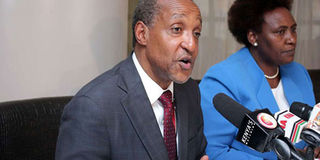Great opportunities to tap for prosperity

Foreign Affairs Principal Secretary Macharia Kamau updates the media regarding the forthcoming blue economy conference, during a press conference at Crowne Plaza Hotel, Nairobi, on June 20, 2018. PHOTO | FILE | NATION MEDIA GROUP
What you need to know:
Japan is a maritime nation surrounded by the seas and controls a vast exclusive economic zone — the sixth largest in the world.
To realise the blue economy, Japan is promoting a free and open Indo-Pacific to connect Africa to North and South America through the Indo-Pacific.
The phrase “blue economy” is a relatively new terminology, while seas, rivers and lakes have had a close connection with the life of human beings since long time ago. I am confident that the first International Sustainable Blue Economy Conference, starting today in Nairobi, will shed light on what it means.
The participants will discuss the effective use of oceans and seas to achieve inclusive and sustainable economic growth and promote social and environmental well-being. Our oceans are under serious threats from plastic litter, the effects of climate change and IUU fishing.
Japan is a maritime nation surrounded by the seas and controls a vast exclusive economic zone — the sixth largest in the world.
MODERNISATION
The country realised modernisation in the late 19th century through the interactions of people and exchange of goods across the oceans. It has achieved economic growth, greatly benefitting from the rules-based international order marked by free trade and freedom and safety of navigation in the seas.
The country fully supports the three basic concepts of the conference, namely prosperity, inclusivity and sustainability.
Japan co-hosted the TICAD Ministerial Meeting in Tokyo last month. At this forum, were representatives from African countries, including Kenya’s Foreign Affairs Cabinet Secretary, Dr Monica Juma. We discussed “Economic Transformation for Inclusive Growth”; “Healthy and Sustainable Society for Human Security”; and “Strengthening connectivity for Africa and Beyond.” I believe these three themes have relevance to the basic concept of blue economy.
MARITIME ORDER
To realise the blue economy, Japan is promoting a free and open Indo-Pacific to connect Africa to North and South America through the Indo-Pacific. This emphasises the importance of rules-based free and open maritime order. Any disputes should be resolved peacefully based on international law.
As was noted at TICAD 6 Nairobi Declaration, Africa shares the importance of these elements in the African Integrated Strategy 2050. Rule-based maritime order and security should be the basis of a sustainable blue economy.
Secondly, Japan considers transportation infrastructure crucial to enhancing the connectivity. It supports development of major economic corridors in Africa by assisting with master plans and investing in infrastructure projects.
BIG FOUR AGENDA
In Kenya, there are projects including the development of ports, roads and a Special Economic Zone in Mombasa, which is a gateway to the East Africa-Northern Corridor. Kenya has been the biggest recipient of Japanese Overseas Development Assistance in sub-Saharan Africa, and we have implemented projects in line with the Big Four agenda.
I am proud that Japan is co-hosting the conference with Kenya. Let us make the 21st century synonymous with prosperity, inclusivity and sustainability by pushing the blue economy forward.
Mr Sato is the Japanese State Minister for Foreign Affairs, and is attending the Sustainable Blue Economy Conference in Nairobi. [email protected]





